Revisiting the film of Stephen King’s Christine
We look back at the time when John Carpenter tackled the Stephen King story, Christine...
This article comes from Den of Geek UK.
The Film: Arnie Cunningham (Keith Gordon) is the kind of glasses-wearing, socially awkward nerd that never does well in high school films, given a modicum of cool cred by his best friend and star footballer, Dennis (John Stockwell), who has to protect Arnie from the school bullies. When he sees a bust-up ‘58 Plymouth Fury though, it’s love at first sight for Arnie, who decides to buy and fix up the car, named Christine, ignoring warnings from parents and friends alike and attracting attention from a local cop (Harry Dean Stanton, always a bonus). As Christine is patched up, Arnie starts to shed his nerd status and obsesses over his car, which seems to have a mind of its own.
I remember the first time that I could drive out on my own in my car. That intoxicating feeling of being able to go anywhere you want, at any time, however far away. It’s a sudden and heady knowledge of independence, of escape. Of course, I only had a little Fiat Punto that, though given to mechanical temper tantrums, was decidedly not evil (nor could it regenerate itself, much to my bank account’s disappointment). Though Arnie’s choice of car proves to be a terrible one, it’s not surprising that he finds himself defending his decision to purchase her.
For Christine is a tale of teenage rebellion and independence, one in which a boy blighted by strict parents, bullying, and isolation finds a sense of purpose that makes him feel better about himself. Unfortunately, it also involves murder. In this respect, Christine shares its DNA with Stephen King’s earlier work, Carrie, in that an ostracised teenager finds a form of empowerment against their antagonists in the supernatural. Keith Gordon’s Arnie isn’t quite as gauche or naive as Carrie White, but he gets just as mad, albeit in a less telekinetic way.
Like Carrie, Arnie is attacked from all sides. His parents loom over him and control his every decision, Buddy Repperton and his gang attack him in his lessons, whilst Dennis’ other friends barely give him the time of day. Arnie’s transformation into sweaty, arrogant parental nightmare runs parallel to Christine’s first regeneration, the pair developing a parasitic relationship that can only be described as icky. As an adaptation, Christine lacks the raw power of De Palma’s earlier film, but it makes up that by bringing forth a wicked sense of black humour.

The Time Out review pointed to the way in which John Carpenter and Bill Phillips’ adaptation taps into King’s ‘50s nostalgia, both through the soundtrack but also in the way in which the story is presented. It might take place in 1978, but it feels as if it would stray back two decades earlier at any moment to the kind of stories Ron Howard used to star in. But this is a leaner American Graffiti with teeth, where teenagers in cars are also murderous, angry, and probably a little more in love with their engine than is strictly necessary.
Carpenter was coming off the back of the unsuccessful release of The Thing and admitted that he took on Christine as a job to aid his career rather than connecting to it as a personal project. He had read King’s novel and didn’t find it particularly scary which is reflected in the film itself. There aren’t many outright moments of terror here and however fun Carpenter and Phillips make it (which is very), there are still aspects of the film that feel a little workmanlike. The human characters often feel a little thin, particularly Dennis’ friendship with Arnie, which works in the moment, but doesn’t convey much of a history between them, or why Dennis would go to such lengths for his friend.

What Carpenter does brilliantly though is bring Christine herself to life. We are granted an introduction to Christine on the production line; the camera lingers on the car body, almost leeringly, as it would for a particularly attractive female love interest. She’s the only bright red car in the assembly line, shining out from amidst the white models, lights beaming, paintwork gleaming. It’s only when she slams her bonnet onto the hand of a factory worker that the spell breaks, expelled completely when another man is found dead in the driver’s seat.
From that moment on, Christine feels unnerving whenever she’s onscreen; even when stationary, there’s a serene menace to her. Without this, the film simply couldn’t work. In the hands of a lesser director, a possessed car could have been a device too daft to work. Carpenter, however, acknowledges the innate silliness and uses it to his advantage, such as with the use of the radio as a way of communication. The darker streak of knowing humour that runs through the scenes with Christine offsets the ridiculous aspects and makes her feel like a character in her own right.

It is fitting that Christine is the star of the show here and Carpenter clearly knows that showcasing her is the best way to make this movie as entertaining as it is. Though the characters are sketched thinly, the theme of teenage rebellion gives the film more depth than a movie about a murderous, possessed car has a right to. Throw in a little knowing humour and Christine is a King adaptation ideal for this horror-themed time of year.
Scariest Moment: More chilling and mesmerising than properly scary, but Christine rebuilding herself is a superb marriage of incredible special effects, which don’t appear to have aged, and the slow realisation that Christine cannot be stopped.
Musicality: The soundtrack is one of the film’s strengths, a combination of music composed by Carpenter and Alan Howarth, as well as songs from the 50s, the decade of Christine’s arrival into the world. It gives the film that nostalgic Americana feel that King so often invokes in his work as well as providing a creepy and blackly comic way of communicating for Christine.
A King Thing: Possessed possessions. King often plays with the idea that possessions can be influenced and transformed by events that involve them. In the novel, King has Christine possessed by the evil spirit of her former owner, Roland L. DeBay, but Carpenter chooses to have Christine malevolent from the day of her creation.
Join me next time, Constant Reader, as we meet the Children Of The Corn…
Follow our Twitter feed for faster news and bad jokes right here. And be our Facebook chum here.
